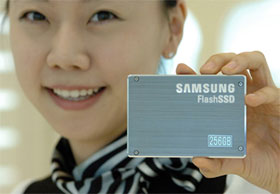Misconceptions about SSD hard drives
Few think that the popularity of solid-state SSDs is partly contributed by the misconceptions of the technology world .
In late 2008, many IT experts had predicted: '2009 will be the year of solid-state drives (Solid State Disk - SSD)' and they were not wrong. But few people know that the reason SSDs are becoming more and more popular is the 'effort' of the misperception that the technology world is giving it.
Enlightenment first: SSD helps computer boot faster
In the early days of the market, this was absolutely true because at that time, the world was only able to receive SSDs with 'tiny' capacity with only 8 GB, 16 GB or 'the worst' is only 32 GB. With the current IT world, a capacity hard drive that is almost impossible to solve many problems and it forces users to not install many applications on the computer. Obviously, the less a system is installed with a system, the shorter its boot speed will be. Test data showed that an SSD-equipped computer usually only took 20 seconds to boot.
But things have started differently since 64 GB or more hard drives began to hit the market, and more and more people are starting to realize a 'cruel' fact that SSDs don't help. How much they shorten the time to start the computer. As more applications are installed, experts find that the boot times of systems with SSDs still increase by at least 15 to 20 seconds and are equivalent to those of mechanical disk drives (HDD). .
Second reception: SSD saves battery for laptop
 With this second misconception, there is no need to spend too much time researching that people can also see that it is absurd because the SSD is essentially an electronic device and cannot say a consumer electronics device. consuming less power than a mechanical device (HDD).
With this second misconception, there is no need to spend too much time researching that people can also see that it is absurd because the SSD is essentially an electronic device and cannot say a consumer electronics device. consuming less power than a mechanical device (HDD).
However, there is an approximate fact that SSDs are designed to operate in low-power systems and that has led many to mistakenly believe that SSDs make their laptop batteries work longer.
The misconception about SSD's power consumption is also related to the misunderstanding of the power consumption mechanism of every computer that many people still have. In each computer, the screen is always the most power-consuming device followed by CPU, memory, graphics processor (GPU), optical drive (CD / DVD drives still consume the most amount of power. fixed even if they are not working).
Third reception: SSD has faster read / write speed
In fact, the technology world has so far not yet debated the possibility of SSDs. In fact, the hardware market has also received some really fast SSD products. It's the X25-M model for the consumer consumer group and the X25-e for Intel-made servers.
To date, SSD manufacturers have stated that they are continuing to improve the read / write speed of SSDs further. SanDisk is one of the companies that will announce the release of a 100x SSD model next year.
But how fast are SSDs now? Experts from information magazine Information Week tested and compared the 80 GB X25-M product from Intel and Velociraptor 300 GB from Western Digital. With SATA 3.0 technology, the speed of 10,000 revolutions of Velociraptor is still considered to be the fastest speed HDD in the traditional hard disk drive product line. As a result, the X25-M has a write speed of 256.7 MBps and Velociraptor has a speed of 250.3 MBps. In the second test, the experts took 8 GB of data from those 2 drives to transfer to a 3rd drive. Intel's X25-M SSD took 264 seconds and Velociraptor lost . 264 seconds. Tests of reading speed, read and write speed, etc. also give little difference.
With these tests showing that, during normal use with too little difference, it is hard to say that SSD is faster than HDD. And if you want to see a clearer difference, the advice of experts is that users should wait at least until mid-2009.